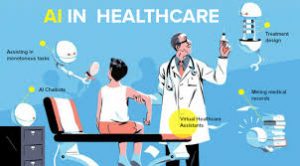Top 12 Ways Artificial Intelligence Will Impact Healthcare
Artificial intelligence is poised to become a transformational force in healthcare. How will providers and patients benefit from the impact of AI-driven tools?
AI offers a number of advantages over traditional analytics and clinical decision-making techniques. Learning algorithms can become more precise and accurate as they interact with training data, allowing humans to gain insights into diagnostics, care processes, treatment variability, and patient outcomes.
Katherine Andriole, PhD, Director of Research Strategy and Operations at Massachusetts General Hospital (MGH), counted down the top 12 ways artificial intelligence will revolutionize the delivery and science of healthcare.
UNIFYING MIND AND MACHINE THROUGH BRAIN-COMPUTER INTERFACES
Brain-computer interfaces could drastically improve quality of life for patients with ALS, strokes, or locked-in syndrome, as well as the 500,000 people worldwide who experience spinal cord injuries every year.
DEVELOPING THE NEXT GENERATION OF RADIOLOGY TOOLS
Artificial intelligence will enable the next generation of radiology tools that are accurate and detailed enough to replace the need for tissue samples in some cases, experts predict.
EXPANDING ACCESS TO CARE IN UNDERSERVED OR DEVELOPING REGIONS
Artificial intelligence could help mitigate the impacts of the severe deficit of qualified clinical staff by taking over some of the diagnostic duties typically allocated to humans.
REDUCING THE BURDENS OF ELECTRONIC HEALTH RECORD USE
Artificial intelligence may also help to process routine requests from the inbox, like medication refills and result notifications. It may also help to prioritize tasks that truly require the clinician’s attention, making it easier for users to work through their to-do lists.
CONTAINING THE RISKS OF ANTIBIOTIC RESISTANCE
Electronic health record data can help to identify infection patterns and highlight patients at risk before they begin to show symptoms. Leveraging machine learning and AI tools to drive these analytics can enhance their accuracy and create faster, more accurate alerts for healthcare providers.
CREATING MORE PRECISE ANALYTICS FOR PATHOLOGY IMAGES
Analytics that can drill down to the pixel level on extremely large digital images can allow providers to identify nuances that may escape the human eye.
BRINGING INTELLIGENCE TO MEDICAL DEVICES AND MACHINES
Smart devices are taking over the consumer environment, offering everything from real-time video from the inside of a refrigerator to cars that can detect when the driver is distracted.
ADVANCING THE USE OF IMMUNOTHERAPY FOR CANCER TREATMENT
Machine learning algorithms and their ability to synthesize highly complex datasets may be able to illuminate new options for targeting therapies to an individual’s unique genetic makeup.
TURNING THE ELECTRONIC HEALTH RECORD INTO A RELIABLE RISK PREDICTOR
EHR analytics have produced many successful risk scoring and stratification tools, especially when researchers employ deep learning techniques to identify novel connections between seemingly unrelated datasets.
MONITORING HEALTH THROUGH WEARABLES AND PERSONAL DEVICES
Almost all consumers now have access to devices with sensors that can collect valuable data about their health. From smartphones with step trackers to wearables that can track a heartbeat around the clock, a growing proportion of health-related data is generated on the go.
Collecting and analyzing this data – and supplementing it with patient-provided information through apps and other home monitoring devices – can offer a unique perspective into individual and population health.
MAKING SMARTPHONE SELFIES INTO POWERFUL DIAGNOSTIC TOOLS
The quality of cell phone cameras is increasing every year, and can produce images that are viable for analysis by artificial intelligence algorithms. Dermatology and opthalmology are early beneficiaries of this trend.
REVOLUTIONIZING CLINICAL DECISION MAKING WITH ARTIFICIAL INTELLIGENCE AT THE BEDSIDE
AI can provide earlier warnings for conditions like seizures or sepsis, which often require intensive analysis of highly complex datasets.
For full report read:
https://healthitanalytics.com/news/top-12-ways-artificial-intelligence-will-impact-healthcare









